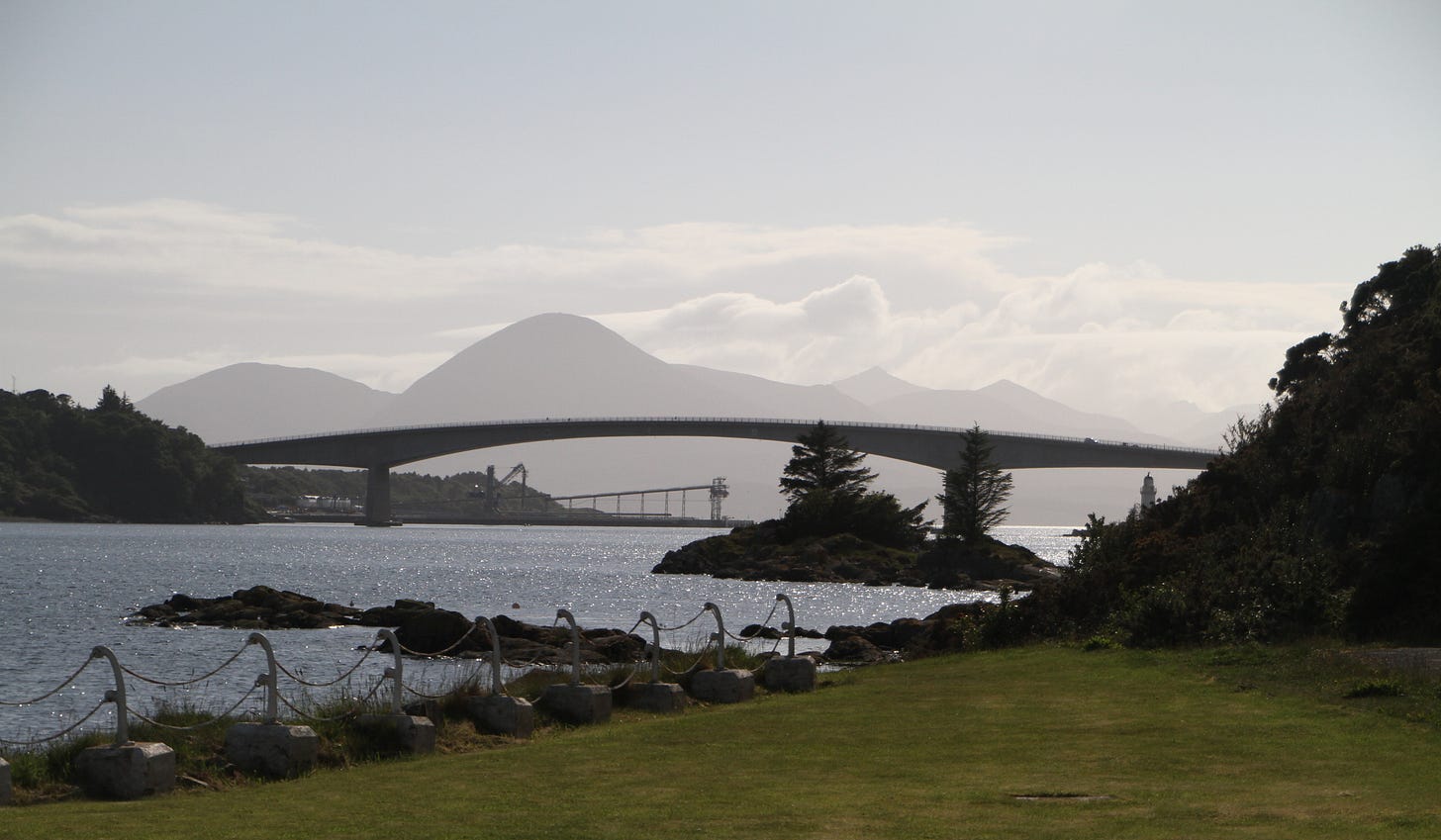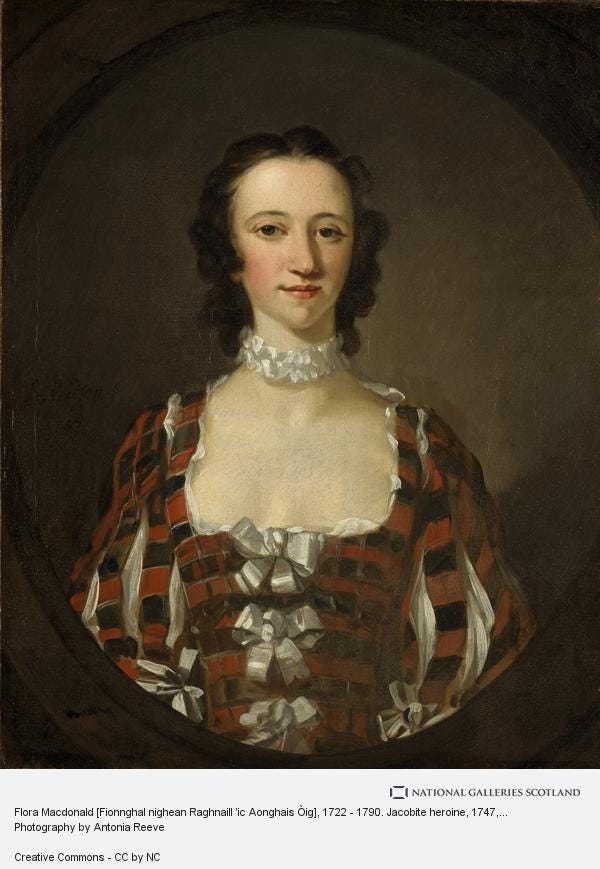Spirit of Place: Over the Sea to Skye
Bonnie Prince Charlie escaped to this misty isle after his disastrous attempt to take over the English throne. The islanders retain mixed feelings about him today.
Portree, Scotland -- It is unfortunate that Samuel Johnson and James Boswell didn't have better weather during their 1773 visit to the isle of Skye. Had it not rained for much of the month they were there, Johnson, the celebrated English essayist and lexicographer, might have sketched a more alluring picture of this magnificent landscape in "A Journey to the Western Islands of Scotland." As it was, he barely mentioned his surroundings. Although he made some keen observations about life on the island, these were often punctuated with dyspeptic comments on the customs of Skye folk.
"In the penury of these malignant regions, nothing is left that can be converted to food," Johnson complained, adding, "The goats and the sheep are milked like cows."
As for Boswell--whose own account of the voyage, "The Journal of a Tour to the Hebrides," was a warmup for his later volume, "The Life of Samuel Johnson"--the Scottish lawyer turned writer was too busy jotting down everything the great man said to take much notice of the scenery."
It's a pity, because an influx of tourism might have been just the thing to slow what, by that time, had become a mass exodus of starving islanders. Their luck had been turning steadily worse since 1746, when many in the Hebrides and the Highlands fought alongside Charles Edward Stuart--Bonnie Prince Charlie--during his disastrous attempt to wrest the English throne from the Hanovers and restore it to his family. The so-called Jacobite rebellion ended with the massacre of Charlie's bedraggled army at Culloden Moor and the flight of the prince to Skye disguised as an Irish maidservant.
Although the current Queen of England, Elizabeth II, is a direct descendant of the Hanovers, it is nevertheless difficult to find anyone born in Britain who cannot sing at least the first verse of the "Skye Boat Song":
Speed bonnie boat like a bird on the wing,
'Onward' the sailors cry,
Carry the lad that's born to be King,
Over the sea to Skye.
The defeat of Bonnie Prince Charlie brought a century of misfortune to the Highlands and Islands, starting with the breakup of the old clan system and culminating in the mass evictions known as the Clearances. Even as Johnson and Boswell dined in a public house at Portree, Skye's main harbor, a ship lay waiting offshore to take the next load of emigrants to America.
Today, with its sparse population, the island has the look of a lost paradise. In Gaelic, the language now spoken by only a minority of the inhabitants, it is called Eilean a' Cheo, the Misty Isle. During the late fall and winter, Skye more than lives up to its name, enduring frequent bouts of rain and fog. Yet spring and summer can bring long, dry days, when the setting sun kindles the sky and the cliffs into a blaze of pinks and yellows. It is the ever changing northern light that gives Skye its unsettling beauty. One day the island is gray and brooding, the next finds the moors bathed in a soft, golden luminescence.
Although Skye is 50 miles (80 kilometers) long, it is so deeply penetrated by lochs and inlets that no point is more than five miles from the sea. The island is really a cluster of peninsulas, which on the map take the unmistakable form of a giant lobster. There are deep cobalt lochs, boggy moors dotted with heather, pinnacles of volcanic rock, quiet glens of birch and oak, waterfalls roaring over precipices to the surf below.
And standing like sentinels over this varied landscape are the gray, runneled peaks of the Cuillin Hills, easily the most dramatic mountains in Britain.
The 20th century came slowly to Skye. Television did not arrive until 1966, and there was no movie theater when I visited at the beginning of the 1990s. Much of the islands's economic life still revolved around crofting, the system of land tenancy introduced by the clan chiefs more than 200 years ago. Cattle and blackface sheep roam everywhere. Yet few of the crofts were are large enough to support a family. Those islanders who cannot find local jobs locally, in fishing, tourism, or the building trades, must work on the mainland and commute by ferry.
Although Skye is a tranquil place today, it was not always so. In earlier times the island's two major clans--the MacDonalds and the MacLeods--vied so savagely for control of Skye that the streams were often clogged with bodies. One Sunday in May 1578, a group of MacLeods was worshipping in the church at Trumpan, on Waternish peninsula, when a band of MacDonalds sailed into nearby Ardmore Bay. The MacDonalds barred the church doors and set the building's thatched roof ablaze. But a young girl escaped the inferno and got word to the MacLeod chief at Dunvegan Castle, whereupon a revenge party descended on the MacDonalds before they could retreat and butchered them to a woman and a man.
Johnson and Boswell paid a courtesy call to Dunvegan Castle during their 1773 trip. It is still inhabited by the descendants of the MacLeod chiefs, although much of it is now a museum. Among its exhibits are the tattered remains of Johnson's thank-you letter to Norman MacLeod. Yet, perhaps not wanting to seem to be taking sides in the clan rivalry, the pair also accepted an invitation to dine with Flora MacDonald, the island's celebrated heroine.
After the disaster at Culloden, almost three decades earlier, Flora had risked her life to help Prince Charlie hide out on Skye until he could escape to France.
Johnson harbored strong Jacobite sympathies, even though the Hanovers were now firmly ensconced on the English throne. His famous accolade to Flora MacDonald--"a name that will be mentioned in history, and if courage and fidelity be virtues, mentioned with honor"--might have been considered treasonous had it comes from a less illustrious source.
As for Prince Charlie, he never returned to Skye, nor to Scotland, and died an alcoholic in Rome. Some of the islanders are still miffed today that he never sent Flora MacDonald so much as a postcard, after all she did for him. Perhaps this is why you rarely hear anyone singing the last verse of the "Sky Boat Song":
Burned are our homes, exile and death,
Scatter the loyal men;
Yet, ere the sword cool in the sheath,
Charlie will come again."
Note: This article is adapted from a piece that originally appeared in the International Herald Tribune. Coming up on “Words for the Wise” this week: More on the origins of Covid-19, and some thoughts on courage.






